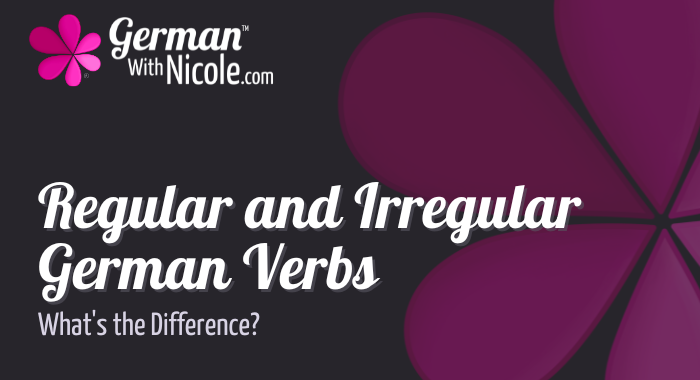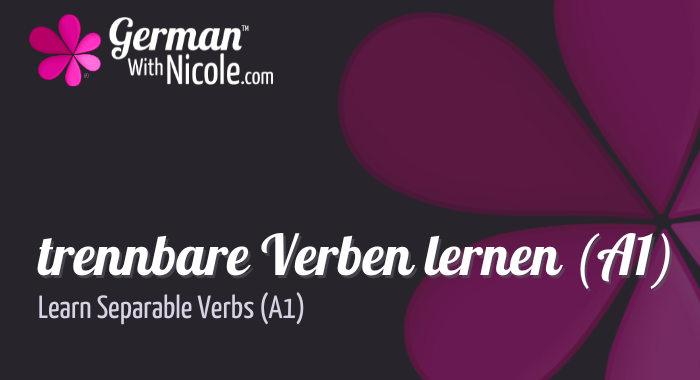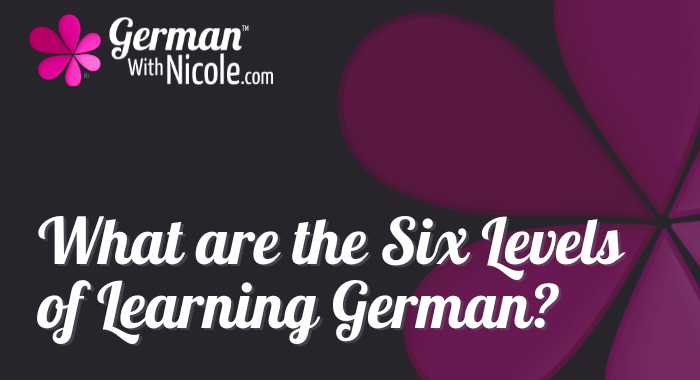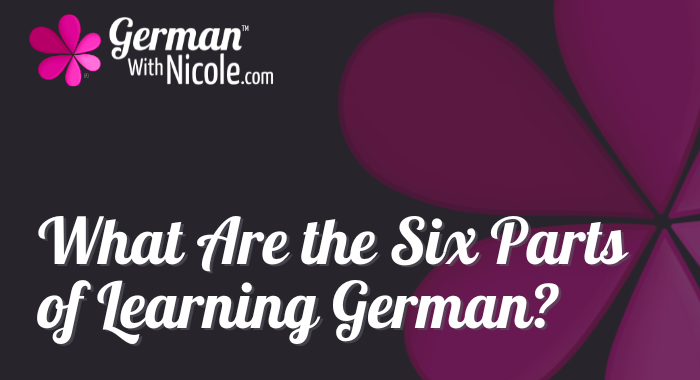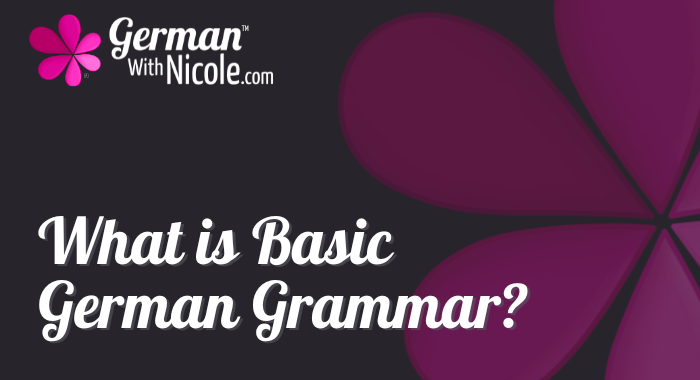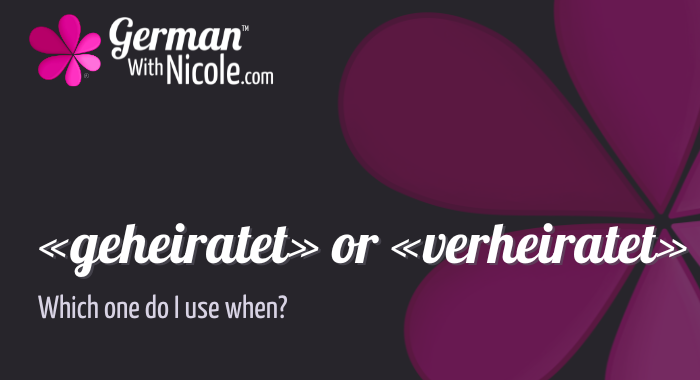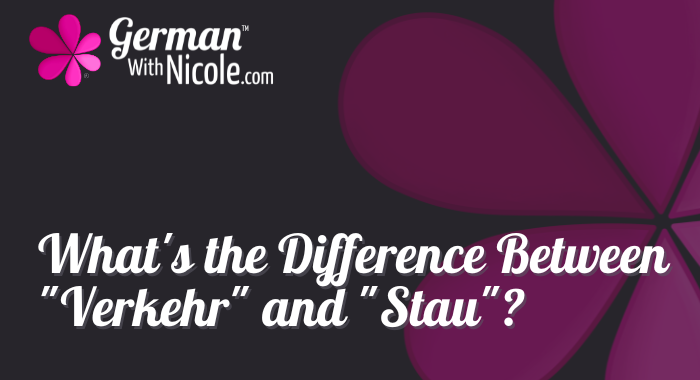das Blog
Deutsch lernen
Regular and Irregular German Verbs: What's the Difference?
Almost all of the people who sign up for private German lessons have already run into German verbs and their conjugations.
When we get to the Perfekt (the present perfect or spoken past tense), it's always interesting to hear what they think of it so far.
Here are a few of the top questions people have asked me about learning the Perfekt:
-
Are these regular or irregular verbs?
-
What's the difference between them?
-
What's the pattern for these verbs? And for these verbs? And f…
Lernen Sie trennbare Verben ~ Learn German Separable Verbs
Today you get to learn separable verbs (trennbare Verben) just like one of my German clients!
This is a technique I've used with dozens of German learners and it makes separable verbs a kinaesthetic exercise--and that in two different ways.
You'll need print out or write out some cards, and to have one supply to have ready when you start the video.
Los geht's!
Step 1: Print out or make these cards of trennbare Verben
Download this PDF of 4x6 cards and print them.
If you can't print them, …
What are the Six Levels of Learning German?
If you've seen the combinations A1, B2 or C1 on your German books but you don't know or understand what they mean, this post is for you!
There are six total combinations of letters and numbers: A1, A2, B1, B2, C1 and C2. These are simply guidelines for figuring out where you are in the German learning process.
The name for this straightforward scale is the Common European Framework of Reference for Languages or the CEFR.
Why the CEFR is so helpful
This scale is so clear, so helpful for Germa…
What Are the Six Parts of Learning German?
Ask any new German learner and they will say German has a million parts and a gazillion words and then you can add the words together to makes new words and...
Stop!
There are only six parts to learning German.
No one part is more important than the other, either, as they are all part of the same machine, if you will.
Think of it like a car.
Does a car function well if part of it is missing or broken? Not usually!
A couple of weeks ago my car battery died (I'll spare you the details becaus…
3 New Ways to Learn German at Home
You could be at home, you could be in a park, you could be on your own balcony.
Every place is a good place to learn a bit of German.
Here are three new ways you can learn a bit of German in any of those places.
1. eine Wortsuche
A word search is a good way to engage with German over a bit of time, but it's not so much energy that you can't get started or keep focused.
In fact, that's exactly what one client said about the newest word search activity:
"The word search was so entertainin…
What is Basic German Grammar?
The A1 or beginner's level of German is frequently underestimated in its importance for learning German.
Starting at the beginning is not only the only place to start, but it's the most important place to start to understand German grammar.
If you're my client you'll hear this often:
You can't build a house on sand, so build a strong foundation.
One of the hardest times for my A2 clients (or B1 or B2 for that matter) is when we start a new topic involving some kind of grammar and they di…
Ein Gedicht: Wenn die Hoffnung nicht wär
Guten Morgen allerseits!
Heute habe ich ein Gedicht für euch. So können Sie das Gedicht lernen:
1. Laden Sie das PDF herunter und lesen Sie das Gedicht.
2. Schlagen Sie Wörter nach, die Ihnen neu sind. Schreiben Sie einen Kommentar, wenn Sie eine Frage haben.
3. Schauen Sie das Video.
4. Schauen Sie das Video nochmal und sprechen Sie mit.
5. Sprechen Sie das Gedicht laut vor. Gut ist's!
*
Good morning everyone!
Today I have a poem for you. Here's how you can le…
Why I Loathe Trick Questions in German Learning Books
Heads-up: this is a rant post.
A long time ago I used a German book for both classes and lessons that wasn’t a good fit for either population. I didn’t like the layout, I didn’t like the cartoons, the instructions weren’t always clear, and sometimes the workbook exercises differed from what was in the chapter.
That made teaching with this book difficult, and it created an excessive amount of prep work, which caused me a lot of stress, because it also didn’t answer my students’ many questions. …
When do I use "geheiratet" and "verheiratet"?
"Geheiratet." Nein. "Verheiratet." Ich weiss es nicht!
I know how it goes, these two can be really tricky, however they are similar enough to English that you can learn a couple of associations to help you keep them apart in your mind.
Sometimes you simply need rote memorization, and sometimes you need a way of remembering which one is which. Sometimes this is an Eselsbrücke (a "donkey-bridge" or a mnemonic device), sometimes you need an association, and sometimes you need a picture in your mi…
What's the Difference Between "Verkehr" and "Stau"?
When you're at the A1 level, "Verkehr" and "Stau" can be tough to differentiate. Most people say "It has something to do with cars!!" If you said that, you're correct! But what's the difference?
The difference is essentially the same as in English, but one use of "Verkehr" might trip you up.
Read on to learn the difference and how not to get tripped up by the one use of "Verkehr"!
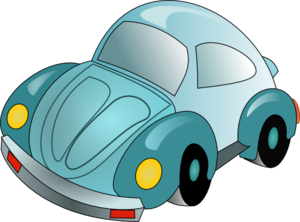 Was bedeutet "Verkehr"?
Was bedeutet "Verkehr"?
Verkehr is simply the word for traffic. You can have multiple types of Verkehr:
- …
Categories
- A1 (69)
- A2 (54)
- B1 (46)
- B2 (23)
- C1 (22)
- Deutsch lernen (80)
- Einkaufen (15)
- Essen (12)
- Grammatik (23)
- Hören (14)
- Landeskunde und Kultur (50)
- Lesen (11)
- Musik (5)
- Nachrichten (4)
- Podcast (64)
- Pronunciation (3)
- Schreiben (3)
- Schwäbisch (4)
- Spiele und Spaß (Games and Fun) (12)
- Sprechen (13)
- Vokabeln (39)
- Video (11)
Would you like to hear about future German classes with Frau Warner?
With the E-Post, you'll receive information on German class registration and goings-on in German classes, all written by Frau Warner. You'll receive an email on Tuesdays, plus an extra email or two when class registration opens or there's something new.
